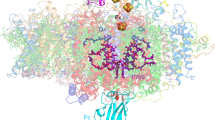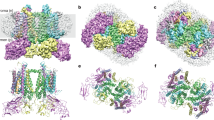Abstract
ON the basis of spectral observations, four b-type cytochromes (b, b3, b6, b7) have been identified in higher plant tissues1. Of these pigments, all of which are bound firmly to the cytoplasmic particles, only cytochrome b3 has been extensively purified2. In the course of an examination of the cytochromes in etiolated mung bean seedlings, we have isolated a soluble pigment which has the properties of a b-type cytochrome; it has an unusual α-band (reduced), with a peak at 555 and a shoulder at 559 mµ. The purification and some of the properties of this component are described here.
This is a preview of subscription content, access via your institution
Access options
Subscribe to this journal
Receive 51 print issues and online access
$199.00 per year
only $3.90 per issue
Buy this article
- Purchase on Springer Link
- Instant access to full article PDF
Prices may be subject to local taxes which are calculated during checkout
Similar content being viewed by others
References
Hartree, E. F., Adv. in Enzymol., 18, 1 (1957).
Hill, R., and Scarisbrick, R., New Phytol., 50, 98 (1951).
Hartree, E. F., Modern Methods of Plant Analysis, edit. by Paech, K., and Tracey, M. V., 4, 197 (Springer-Verlag, Berlin, 1955).
Author information
Authors and Affiliations
Rights and permissions
About this article
Cite this article
SHICHI, H., HACKETT, D. Purification of a New b-Type Cytochrome from Mung Bean (Phaseolus aureus) Seedlings. Nature 193, 776–777 (1962). https://doi.org/10.1038/193776b0
Issue Date:
DOI: https://doi.org/10.1038/193776b0
Comments
By submitting a comment you agree to abide by our Terms and Community Guidelines. If you find something abusive or that does not comply with our terms or guidelines please flag it as inappropriate.



